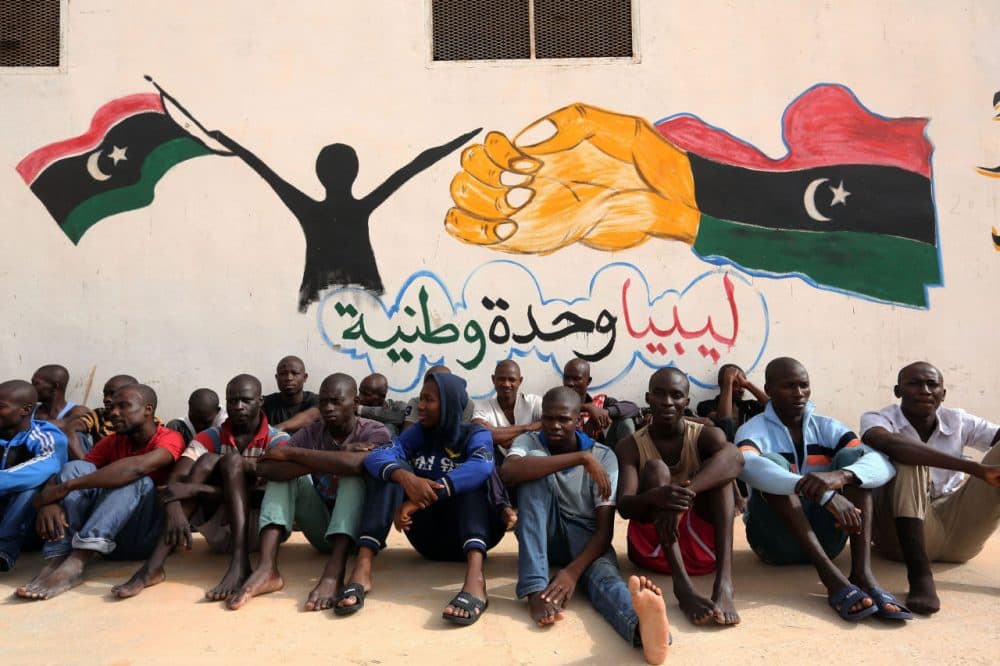Advertisement
European Union Pays African States In Attempt To Stem Migration

In the past couple of weeks, European rescue boats have saved hundreds of migrants trying to cross the Mediterranean Sea, from Libya to Europe.
The European Union announced plans to provide aid to Libya's new government, in hopes that it would help stem the flow of migrants across the sea.
Demetrios Papademitriou, president of the Brussels-based research institute, Migration Policy Institute Europe, discusses the deals with Here & Now's Meghna Chakrabarti.
Interview Highlights: Demetrios Papademitriou
On the deal the UN is working on with Libya
"First of all, they want to have a stable government in Libya, at least as stable as it can be made and then have a deal that would be somewhat similar to the deal that they had with Turkey. That means that they want the full cooperation of the Libyan government to attack the smugglers. And by that, I mean it in the full sense of the word, have their ships confiscated or sunk of whatever it is, hit them where it matters most, the pocket book, and try to understand how they operate so this way they can intervene earlier in the process."
"They also want the Libyans to push back boats that are still in Libyan waters, back to Libya. In other words, do as much as possible to prevent large numbers of people leaving Libya on their way to Europe in this case primarily on their way to Italy. These are the two things that they want more than anything else because the Europeans understand and the last two weeks ago the point has been driven home that they must reduce not only the numbers who are trying to make it to Europe, but they must reduce the number of people that are dying in the central Mediterranean."
Advertisement
On concerns that the deals are putting migrants' right to migrate at risk
"What we have to consider here is the two, in a sense, difficult sides that Europeans nations - forget Brussels for second Italy, let's say, or Germany - how they have to scour the circle. One of them is a fundamental responsibility that they have to try to legislate or act on behalf of all of their people. That is the function of government. And on the other hand, you have both international law, but also rules and practice that in a sense interfere with this."
"So the sweet spot as far as we should be concerned, people who are analysts and are trying to figure these things out, is somewhere whereby those people who are real refugees - by that I mean bona fide refugees, they meet the definition of what a refugee is according to international instruments - that they are protected. Those people who may need protection I suspect that we give them some temporary protection. But those people who are the people that we would call in the United States an authorized migrant, people who may be very nice, like you and I, but at the same time do not have the claim to protection. Those people need to be sent back."
On the critics of the deal between Italian and Libyan leaders
"The humanitarians and advocates have attacked all of these deals. They simply feel that Europe should simply do the right thing as far as they are concerned which is simply find a way to take in all of the people that want to go to Europe without much regard to who these people are or whether they qualify for full refugee status. Off of that matter, people who want to migrate to better their lives and that's now how life works. So in the process of the Europeans trying to reduce the numbers and the number in which people come into Europe, they cut some deals that are a bit, I guess, most of us will sort of turn our nose at. You hope that a message will descend, both to smugglers, with the cooperation of course of the send in or transit countries like Libya and to would be migrants themselves, which is a message that says, 'Don't try this way.'"
On the effectiveness of the EU’s strategy
"We've had nothing but lack of success. You know, failure is what defines this. The European Union, at the level of the relevant commissioner, meaning a minister for the EU, the European Union has been trying these negotiations for about 13, 14, 15, years now. But what they've been putting on the table is just a couple Euro, three, five, seven million that kind of thing."
Guest
- Demetrios Papademitriou, president, Migration Policy Institute Europe. The organization tweets @MigrationPolicy.
This segment aired on June 3, 2016.